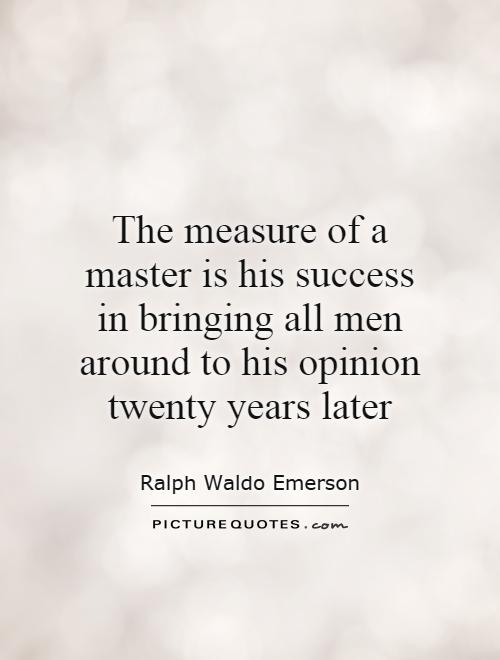The measure of a master is his success in bringing all men around to his opinion twenty years later

The measure of a master is his success in bringing all men around to his opinion twenty years later
Ralph Waldo Emerson, a renowned American essayist, lecturer, and poet, was a firm believer in the power of individualism and self-reliance. He was a leading figure in the transcendentalist movement of the mid-19th century, which emphasized the importance of intuition, spirituality, and the inherent goodness of people. Emerson's writings, including his famous essay "Self-Reliance," have had a lasting impact on American literature and philosophy.Emerson's quote, "The measure of a master is his success in bringing all men around to his opinion twenty years later," speaks to his belief in the power of ideas to shape the course of history. Emerson believed that true mastery lay not in forcing others to conform to one's own beliefs, but in inspiring them to see the world in a new way. He understood that change takes time, and that the true test of a master's influence is whether his ideas stand the test of time.
Emerson's own ideas have certainly stood the test of time. His emphasis on individualism, self-reliance, and the importance of nature continues to resonate with readers today. His call to trust one's own intuition and to follow one's own path has inspired countless individuals to live more authentic and fulfilling lives.
Emerson's influence can be seen in the work of later writers and thinkers, such as Henry David Thoreau, Walt Whitman, and Margaret Fuller. His ideas have also had a lasting impact on American culture, shaping the way we think about nature, spirituality, and the individual's place in society.












 Friendship Quotes
Friendship Quotes Love Quotes
Love Quotes Life Quotes
Life Quotes Funny Quotes
Funny Quotes Motivational Quotes
Motivational Quotes Inspirational Quotes
Inspirational Quotes